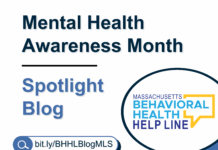At the heart of our mission and as a priority in our strategic plan, the Massachusetts Library System (MLS) supports our members’ initiatives by providing professional development focused on diversity, equity, inclusion, accessibility, and social justice (DEIASJ). In this interview series, the MLS is pleased to highlight the many ways that our libraries contribute to DEI in their communities. In this post, staff at the Morrill Memorial Library in Norwood, including Liz Reed, Clayton Cheever, Heath Umbreit, Darshana Merchant, and Kate Tigue, will fill us in about how the library’s staff applied what they learned from MLS DEI programs.
Please tell us about how your library contributes to DEI.
DEI work was made central to our library’s work in our most recent strategic planning process when the community identified one of our core service priorities to be “Embrace diversity, equity, and inclusion”. They went further to define that as follows:
“Residents will have materials, programs, and services that increase awareness and understanding of community differences (race, gender, ethnicity, religion, nationality, sexual orientation, socio-economic status, physical and mental stability, etc.) that promote equal opportunity, personal value, and belonging. “
There are three goals that we have defined to help us address this priority:
- The collections, resources, and programs at the library will reflect the needs and diversity of the community.
- Residents will feel like they belong.
- Residents will have a process by which perceived barriers to access will be identified and addressed.
We have specific, time-based, measurable objectives to measure the effectiveness of our actions towards each of these goals.
What DEI services, resources, or programs provided by your library are you most proud of?
Oh gosh, where to begin! We’re very proud of the DEI work we do here at MML, and our successes motivate us to take on more projects and services in the future.
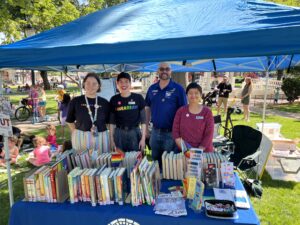
We’ve worked hard to get our staff out into the community to meet people where they are to offer library services. For instance, in the last couple years we’ve joined community groups, gatherings, and celebrations with library pop-ups. Some of our most memorable pop-ups have been at our Town’s annual Pride Picnic, Juneteenth, the Arts & Cultural Festival, and at a big Black History Month event at the high school. Our children’s librarians also offer summer pop-up libraries at schools and at summer camps, and are able to lend books to kids who otherwise wouldn’t have access to materials to support summer reading. Plus, our Outreach Specialist actively seeks out new contacts at churches, businesses, and organizations around town to identify underserved groups and promote library services that will be useful to their needs.
Partnerships have been key to guiding our choices around DEI work, and in making sure we can pull off our projects. We’ve worked with OUTMetroWest on several occasions to offer programming and resources for queer youth, and it’s because of our partnership with multiple local groups that the Pride Picnic has grown into an annual event with support across town departments.
We’re tremendously proud of the sensory-friendly programming for adults that we’ve developed in partnership with local organizations like LifeWorks, Riverside Community Care, and L.E.A.D. Not only have we been able to offer popular programs specifically designed for this part of Norwood’s community, including monthly Sensory-Friendly Movies and a Lego Club, we’ve observed that adult day groups are spending time in our library every day of the week; this indicates to us that we are indeed creating an environment of welcome and belonging for adults with developmental disabilities.
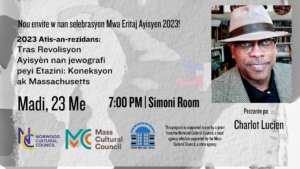
We’ve been able to offer engaging programs for the whole community by partnering with different cultural organizations. For example, by partnering with the Center for Arabic Culture we put together an Arab Mother’s Day mini-festival in 2023 to introduce diverse cultures to our community as well as provide representation for Norwood’s Arab community. Additionally, we’ve launched an annual Artist-in-Residence program funded by our local Cultural Council. We’ve intentionally tried to feature non-white artists from the community in order to center the art, culture, and experiences of various populations. Our 2022 Artist-in-Residence offered workshops to highlight traditional folk art from Northern India, and our 2023 Artist-in-Residence is bringing Haitian heritage to the main stage.
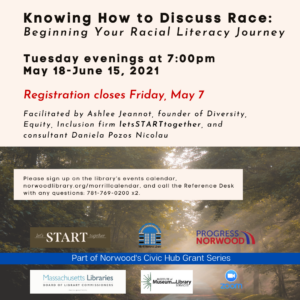 While we know that our patrons are excited to participate in fun and recreational programs, they’re also ready to engage with tougher topics around DEI as well. In the Spring of 2021, we hosted a powerful and successful Racial Literacy mini-course, guided by our expert facilitators from letsSTARTtogether. Then, building on the enthusiasm of our participants, our own staff ran a Critical Disinformation Studies mini-course in the Spring of 2022. Patrons are still talking about this min-course and we’re currently developing a longer term discussion series to meet this need and address additional topics associated with DEI.
While we know that our patrons are excited to participate in fun and recreational programs, they’re also ready to engage with tougher topics around DEI as well. In the Spring of 2021, we hosted a powerful and successful Racial Literacy mini-course, guided by our expert facilitators from letsSTARTtogether. Then, building on the enthusiasm of our participants, our own staff ran a Critical Disinformation Studies mini-course in the Spring of 2022. Patrons are still talking about this min-course and we’re currently developing a longer term discussion series to meet this need and address additional topics associated with DEI.
In 2022 we became the pilot library for the Access to Justice program with the Trial Courts of Massachusetts. We facilitate remote court services for our patrons who otherwise wouldn’t have access to the legal system. The Access to Justice page on our website, which helps direct our patrons to the most requested information from A2J and the Court Service Centers, is currently the 10th most visited page on our website.
We’ve been working closely with the Senior Center in town to help bridge the digital divide for seniors by offering drop-in tech help. Additionally, we’re supporting the Senior Center’s initiative to make Norwood a dementia-friendly town by organizing an Alzheimer’s Awareness training for all Town employees. Our upcoming program for the public with Perkins School for the Blind is garnering strong registration numbers.
And, we’d be remiss if we didn’t shout out our Literacy Department tutoring program through LVM! This program has been a mainstay in our library for years, and it’s not uncommon for students to be so dedicated that they become tutors themselves after graduating from the program. Our Literacy students inspire and inform programs in the library, and library DEI initiatives have in turn promoted the Literacy program to more residents. It’s a win-win!
How did the DEI trainings offered by the Massachusetts Library System help you with your DEI efforts? What trainings were most useful?
Our staff found the Mental Health Support and Libraries series hosted by MLS to be very useful because it provided ideas and resources. A webinar hosted by MLS, Serving Neurodiverse Patrons in Your Library, also gave us program ideas that promote participation and engagement with the neurodiverse community. We’ve been able to put some of these ideas into action with great results!
The webinars addressing Anti-Racist Leadership and White Anti-Racist Allyship were especially powerful. Staff felt empowered to offer programs directly addressing racism, and to take the initiative in conducting our own collection diversity checks. We’ve also stepped up and showed up by serving on the organizing teams behind community events such as Juneteenth and Black History Month.
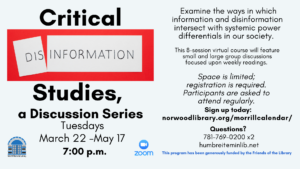 The MLS’ Critical Disinformation Studies mini-course for LIS workers in December 2021 was directly responsible for inspiring our disinformation studies mini-course, for a public audience.
The MLS’ Critical Disinformation Studies mini-course for LIS workers in December 2021 was directly responsible for inspiring our disinformation studies mini-course, for a public audience.
What advice would you give to a library interested to get more involved with DEI?
We are stronger together. It is always better to do something (and risk failure) than to do nothing and simply maintain historical inequities and injustice.
Be humble, we are all imperfect and make mistakes.
When in doubt, always err on the side of kindness.
Speaking up is good, but showing up is better. Building trust with communities who have historically been underserved and underrepresented is incredibly important to get from Diversity, Equity, and Inclusion to Belonging.
It’s not up to people who have been historically marginalized to carry the burden of education and correcting. We need to educate ourselves and offer programs/services proactively.
Take to heart the phrases: “Don’t work for us, work with us,” and “Nothing about us, without us.” It’s important to make sure programs actually serve a real need for marginalized populations rather than just ticking the box of what non marginalized people think looks good.
Work your community connections to find organizations with DEI goals that align with the library’s. They can be valuable partners for co-sponsoring DEI programming and helping to spread the word.
Start building relationships with other town departments so the library will have lots of support if DEI efforts are challenged in the community.
Provide staff training on crisis communication, how to recognize and counter dis- and misinformation, reflecting on employee bias and stereotyping, and have staff conversations about how to implement DEI best practices on a daily basis.
DEI work is a continuous process, not a sequence of checkboxes with a linear ending. We can always do better.
Interview with staff at the Morrill Memorial Library in Norwood, Massachusetts including:
- Liz Reed, Adult and Information Services Department Head
- Clayton Cheever, Director
- Heath Umbreit, Adult and Information Services Librarian
- Darshana Merchant, Adult Services Librarian – Outreach Specialist
- Kate Tigue, Head of Youth Services
Interviewed by Michelle Eberle, Consultant, Massachusetts Library System
